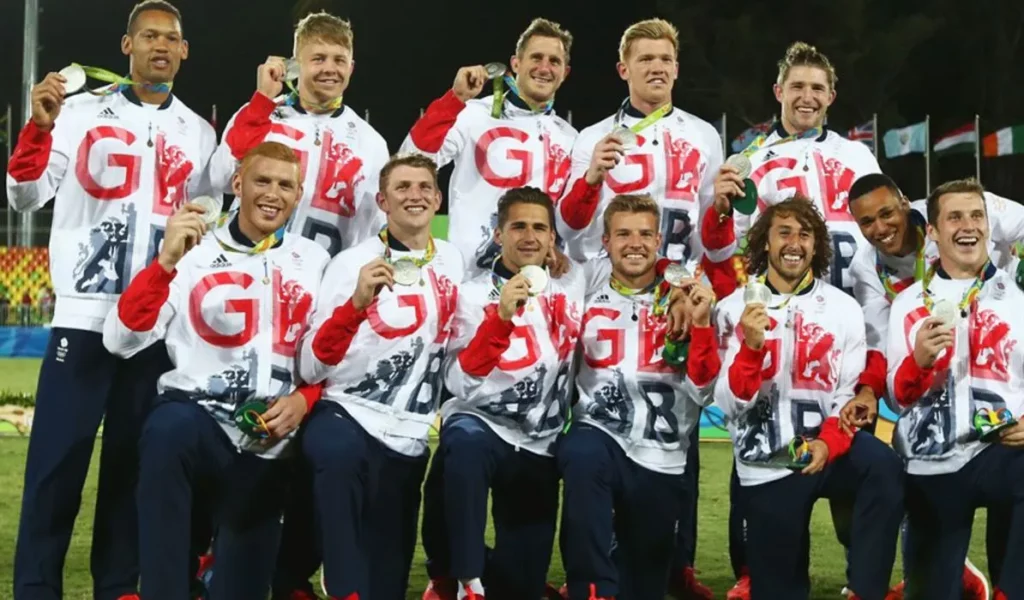#9 - Tom Mitchell
Former England & GB 7s rugby player. Olympic silver medalist.
Tom Mitchell has had a 10 year career at the top level of international 7s rugby. After graduating from Bristol University (BA English & Philosophy) he went to Oxford University for his postgraduate studies. Immediately after getting his Blue he was picked by England 7s to make his World Series debut in 2012. Since then he has served the team as captain for 6 years and also led Team GB 7s to two Olympic Games. In Rio in 2016 Tom and the team came home with a silver medal, the first Olympic medal in the sport for Great Britain. Tom’s 7s rugby career also included two Commonwealth Games appearances, including a bronze medal in 2018. And three Rugby 7s World Cup appearances.
Tom recently had a stint playing in America for LA in Major League Rugby. This proved to be a brilliant adventure for him and his young family. Tom and his wife Flo have a young boy Leo.
The time has come for Tom to move onto new career paths as he steps away from playing professionally. He is exploring a range of roles including media work in 7s, writing, and performance mentoring and coaching, the last of which really indulge his passion for helping people occupy all of their space in the world.

If you hadn’t been an athlete, what would you have gone into after school or university? And why?
I was coming out of my undergraduate degree without an idea of what I wanted to do. I was most likely going to pursue journalism, which would have been interesting, or management consultancy, which most likely would not have been interesting. Perhaps I would have found the courage to be a snowboard instructor which is something I always wanted to do. I certainly feel incredibly grateful that my hard work and passion for rugby turned itself into a career with the help of some wonderful people and some good fortune.
What experience or memory do you cherish most from your days of being a professional athlete?
I tend to separate this answer into two categories, on field and off field.
The best memories of tournaments are the trophy or medal winning moments or the extra big occasions. Top of this list would be the Rio Olympics and the World Series Titles in Cape Town and Vancouver. Although I have never won at Twickenham 7s, the memories of the home crowd and playing in front of family and friends will also last forever.
The off field experiences I treasure might seem banal to describe. But the beauty of a team sport lies in the multiple shared experiences, navigating extreme emotions together through highs and lows, and having the constant community of like minded people.
What’s one thing you’re interested in or care about that most people don’t know?
I have a great passion for nature and the outdoors. It is probably something I lost sight of a bit when I was living in London but I was usually able to indulge this side of me on my trips away with rugby. I loved playing in Vancouver because we saw the mountains, or going to New Zealand with the beautiful countryside and striking coastlines.
At the moment I live in Hampshire with the countryside on the doorstep and coast not far away. Doing my best to explore it as much as possible during the winter months.
The prevalence of mental health problems in elite sport is incredibly high. Why do you think that is and how can we reduce it?
Elite sport creates an unusually testing environment for people, especially when we consider that more often than not these people are very young. The arena and industry of pro sport demands a lot from individuals as it moves them along to the extremes of the emotional spectrum. It also places huge emphasis on competition, comparison and tangible success. Unfortunately, I don’t think we equip athletes very well to navigate this environment especially considering some younger athletes still have a huge amount of brain development still to happen.
The narrative around mental health has shifted in a positive direction in society which has in part been led by sport. However, the teaching of mental skills and education around mental health can be brought into the central pillars of daily work in pro sport environments. There are also lifestyle features that are common which we can address such as screen time, choice of recreational time, and diet.
Careers are full of ups and downs. What caused you pain and how did you deal with it?
Losing. Injury. Fear of letting people down or underachieving. Responsibility for others.
All of the above at one time or another have caused me to feel anxious, stressed out, irritable or emotionally low (sometimes all of these at once!). I did not always manage it very well. There have been times when I have tried to battle through and be hard on myself when really some acceptance and self-compassion was more beneficial. However, this current reflection is only possible because I had those tough challenges. So I am grateful for the challenging scenarios as they served as a brilliant stimulus for growth. But I must stress that the growth only happened because I was able to move through the difficult times with great people around me to help, support and enlighten me.
Can you tell us about your experience of retiring and transitioning into the ‘real world’?
Unpacking the challenge briefly for people who don’t make an extreme career shift in their 30s, I think the roots of the difficulty lie in a few different areas. Divorcing yourself from a group of people and a community is a significant one. I am stepping away from a job which allowed me to do something I love every day. Excitement levels in pro sport are incredibly high and the loss of the emotional extremes (even the massive disappointment) is something that could manifest in a deep sense of lack.
I have never turned my mind away from the inevitability of retirement. To some degree I have embraced it and looked forward to it because it’s a rare opportunity to do something completely different and have fresh experiences. Because of this I always sought to keep my identity in check so that I didn’t become too wound up in ‘Tom Mitchell the rugby player’ but I also tried to dip into things outside of playing such as writing articles or working with charities.
With all that said, now I am actually on the journey of transitioning to fresh pastures. I do experience feelings of fear and dread. Depending on the day these feelings can vary in their prevalence but I remind myself they are to be expected and if I must carry them around for a while then so be it! I still have the excitement for what comes next. As I get older I am more accepting that excitement and fear tend to walk the path hand in hand.

Do you have a favourite quote or saying? Why does it resonate with you?
You must live in the present, launch yourself on every wave, find your eternity in each moment. Fools stand on their island of opportunities and look toward another land. There is no other land; there is no other life but this – Henry David Thoreau
Any parting thoughts for those youngsters that might be about to embark on a pro career, those in the middle of one, or those that might be coming towards the end?
Explore and discover the reason you are pursuing this career. Know your ‘why’. It will add an incredibly powerful force to your journey. On top of this, seek out support in understanding why your brain works the way it does. Your unique way of seeing the world is beautiful and worth learning about and it will become a supremely useful skill in your career.
Try not to let it get heavy. Experiencing pressure can be brilliantly revealing and a stimulus for growth. But when it seems to weigh you down over time it’s probably not serving you. At these times it’s important to reach back to the enjoyment. Remind yourself of the game you played as a child because it is still the same game.
Do your best to keep yourself where your feet are. It’s useful to have a long term goal or dream, but the here and now is where it’s all happening! Stay present, grateful for the moments you collect along the way.
Finally, how can people follow what you’re up to and potentially reach out?
Email: thomas.mitchell@olympian.org
Twitter: @TBobbyMitchell
